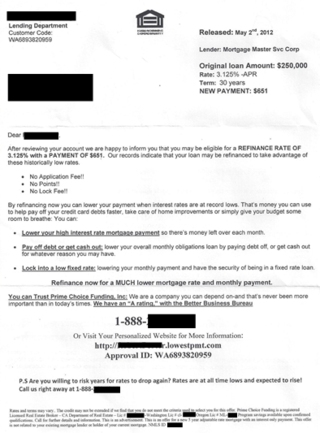 It’s been a while since I’ve shared a POS (piece of solicitation) from the junk mail bag. I don’t have an issue with lenders trying to obtain business from home owners by mailing marketing pieces…although I do wonder why they must resort to marketing to strangers instead of working with past clients.
It’s been a while since I’ve shared a POS (piece of solicitation) from the junk mail bag. I don’t have an issue with lenders trying to obtain business from home owners by mailing marketing pieces…although I do wonder why they must resort to marketing to strangers instead of working with past clients.
This letter was sent last month. It was packaged in a folding security envelope to look as if it may have contained important information, such as the code to an ATM card. It was only a trick to get one to open it.
They start with quoting an APR of 3.125% for a 30 year fixed rate in the upper right corner with a very low payment of $651 on a $250,000 loan amount. That’s a great rate and an amazingly low payment! However if you read the very tiny print on the bottom of the page, you’ll see that what the rate offered is actually based on a 5 year interest only adjustable rate mortgage (ARM). Why not have that information in the upper right corner with the teaser rate and payment?
The lender who sent this is from a company in California. I really recommend working with lenders in your own state where processing and underwriting are done locally as well. Why would they have to mail to Washington state home owners to try to get refinance business?
I also recommend that you use the NMLS Consumer Access site to research any Mortgage Loan Originators you’re considering allowing to assist you with your refinance. The NMLS Consumer Access site will disclose their employment history and whether or not they’re licensed to originate mortgages in Washington. I think it’s also a good idea to “google” their name and the company’s name to learn more about them.
Instead of calling a stranger from out of state for your mortgage needs, do your own research.
If your home is located anywhere in Washington state, I’m happy to help you with your refinance or financing your home purchase. And by the way, I have never bought “a lead” or sent out a piece of junk mail to try to solicit a mortgage prospect.
 As a Licensed Mortgage Originator, I often see credit reports where the borrower has cosigned on a debt for a family member or friend. You may be a parent co-signing on your child’s student loans to help them get a better rate, helping your brother buy a car by co-signing the lease or auto loan or perhaps
As a Licensed Mortgage Originator, I often see credit reports where the borrower has cosigned on a debt for a family member or friend. You may be a parent co-signing on your child’s student loans to help them get a better rate, helping your brother buy a car by co-signing the lease or auto loan or perhaps 









Recent Comments